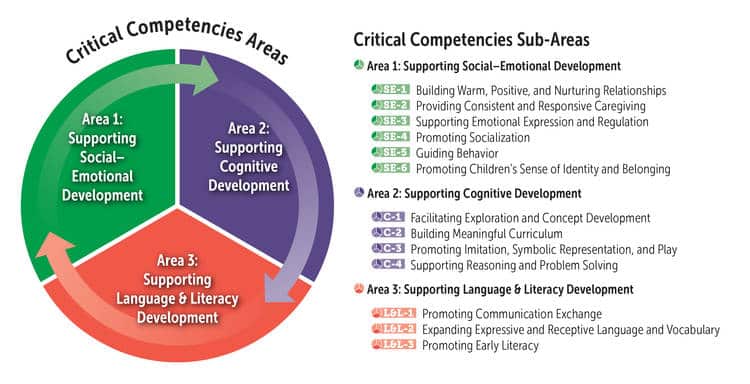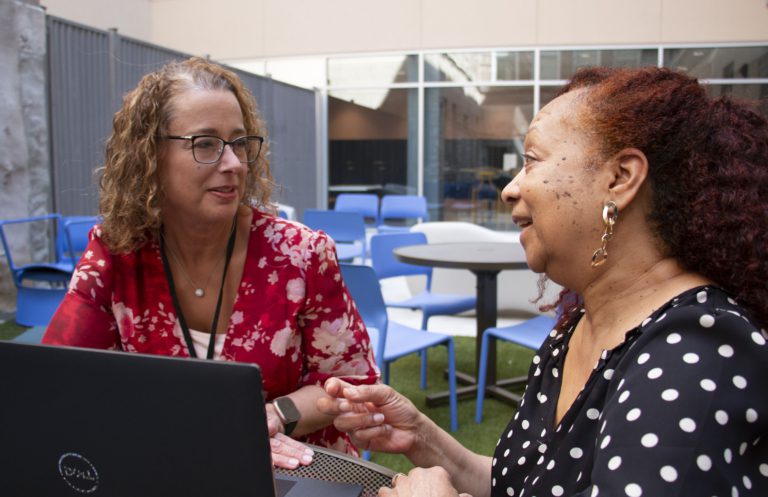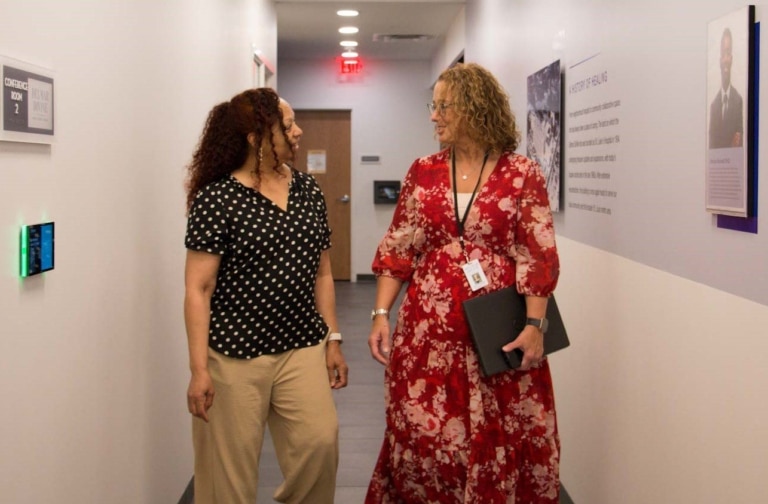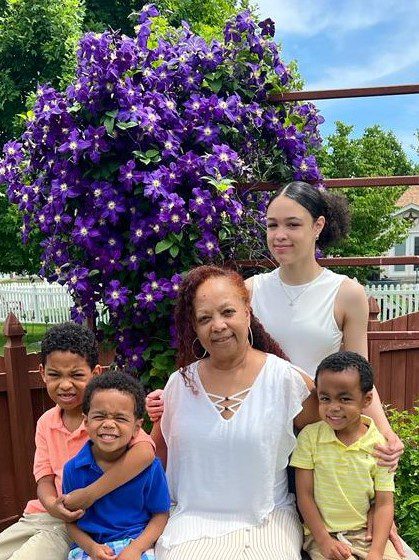How One Educator Puts The Critical Competencies Into Practice

Andrea works closely with the Educare program, which helps childcare providers prepare children for success in school and life. Being a mother and grandmother, inspires her passion for early childhood education and she has spent the majority of her career working in the field.
An Evidence-Based Approach
The ZERO TO THREE Critical Competencies for Infant-Toddler Educators™ are focused on three key areas.
Infant-toddler educators have one of the most important jobs in the world, but too many don’t get the necessary practical resources to support their professional development. The Zero To Three Critical Competencies for Infant-Toddler Educators™ are tools for early childhood educators that address three essential learning and development areas: social-emotional, cognitive, and language and literacy. In practice, implementing critical competencies help support a child’s emotional expression and regulation, facilitate exploration and concept development, and promote early literacy. The critical competencies help educators build the essential knowledge and skills they need to be successful now and support the future of our children.
To understand more about the impact of the critical competencies, we sat down with Andrea Walton, Education Manager for United 4 Children, to talk about how she uses them to nurture young minds. United 4 Children provides comprehensive services to childcare and after school programs that address the many needs of the whole child. The organization’s mission is to empower caregivers through professional development and skills training, as well as meeting community needs where other resources don’t exist.

Setting the Foundation
Ensuring Strong Development for Every Child
My previous role as education manager was a new position in the new program design structure for United 4 Children. So, I had the opportunity to set new goals and priorities for this new department impacting those of the organization as a whole. I love the Ethiopian Proverb which says, “He who learns, teaches.” And I consider myself a life-long learner. So, my desire to learn about Zero to Three’s Critical Competencies for Infant-Toddler Educators™ naturally led me to want to share the curriculum with the many educators with whom United 4 Children works. The organization partners with family childcare providers, group homes, faith-based centers, licensed centers, and after-school programs for school districts.
Many educators have asked for more infant-toddler professional development opportunities. I found that the circle of colleagues United 4 Children engages and shares its team’s expertise with is always looking to grow and delve deeper into the field’s many topics of opportunity. I consider the Zero To Three Critical Competencies for Infant-Toddler Educators™ to be the foundation, with The Zero To Three’s The Growing Brain Curriculum as the bedrock to strong development. United 4 Children’s vision is to see that every child has the foundation to thrive. Understanding the child’s earliest beginning is important to express and advocate for them at the levels of community, business, and government to support that very foundation. I continue to keep this top of mind in my new role as a consultant for United 4 Children. I retired at the end of 2022 but continue to collaborate with United 4 Children’s new education manager, Amy Flesher-Dunnegan.
Although portions of my career have been spent in finance and management, the majority of those 35 years I have dedicated to the early childhood education field. And I’ve done a little of everything: pre-k lead, family home owner/director, center director, early education coach, trainer, and consultant. The last 14 years have been as coach, trainer and consultant. What I am most proud of is my role as wife, mother of four, and grandmother of four – so far! My passion for the field probably arises from these treasured roles. My family is my life!
My family was my introduction to the beauty of children and the wonder in their learning about the world around them. Neil Armstrong and Jacques Cousteau had nothing on them! I was a “baby watcher” long before I’d heard the phrase. I am personally fascinated by the 0 – 3 age group. Brain development and research are an interest as well, so the Critical Competencies for Infant-Toddler Educators™ is a natural draw for me. Learning the why and how behind the behaviors of children is AMAZING! I often wondered what was happening in a child’s brain and what they were thinking. Considering myself an amateur baby interpreter, I enjoyed translating the child’s behaviors, vocalizations/words, and facial expressions. They are the funniest creatures on the planet! While watching them work through problem solving, we can see the purity of their genius — unspoiled, untainted, perfect genius. My goal while working with this age group has always been: How can we adults support, and not hinder, the natural process?
While watching them work through problem-solving, we can see the purity of their genius—unspoiled, untainted, perfect genius. My goal while working with this age group has always been: How can we adults support, and not hinder, the natural process?
Andrea Walton


Transforming Teacher-Child Interactions
Putting Theory into Practice
Understanding what promotes social-emotional, cognitive, and language/literacy development gives the adult tools to support the developing child. If I do not know that an infant’s cry is their means for getting their needs met, I may miss an opportunity to extend my vocal presence, help the child practice waiting short periods and provide consistent, predictable care building trust with the child.
Critical competencies will play an integral part in the professional development plans through the new education department through 2023. The Education Team at the end of last year focused on re-tooling its treasure trove of trainings and incorporating the Critical Competencies for Infant-Toddler Educators™ and The Growing Brain. We are making plans for in-house professional development, partnership trainings, and statewide access to the curriculum virtually. United 4 Children moved into a new facility in December, and now has space for more in-person training options. Financial investments in virtual technology including a hybrid option are underway.
The critical competencies tools are initially planned for the early educators United 4 Children serves. However, there is also a plan to develop resources for family education and support group engagement opportunities. So, the answer is yes! Families can and should take advantage of critical competencies in their interactions with their children and teacher engagement for planning on behalf of their children. Strength in partnership!

When early childhood professionals, like Andrea, learn about the meaning behind behaviors and intracacies of early development, it transforms their practice. Explore our professional development opportunities that can help take your career to the next level.

